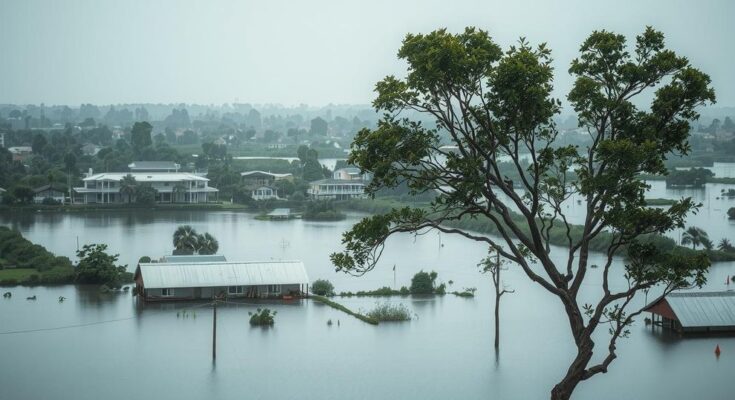The Sahel and Lake Chad region suffers from severe floods, exacerbating existing conflicts and risks of food insecurity. Urgent humanitarian support is needed as local infrastructures are compromised. The international community’s involvement is critical for effective disaster response and long-term resilience efforts, particularly in education and agricultural sustainability.
The Sahel and Lake Chad region faces escalating humanitarian crises due to intensified conflicts, displacement, and climate change effects. Hassane Hamadou, NRC’s regional director, emphasized the urgent need for essential support, including shelter, food, and hygiene supplies. There must also be efforts directed towards enhancing local infrastructures to bolster resilience against future disasters.
Countries like Cameroon and Niger are experiencing continual climate-related disasters, which exacerbate existing conflicts and displacements. Frequent heavy floods significantly impact farmlands crucial for food security and local economies, causing widespread devastation and leading to increased food insecurity. Educational access is also compromised, as schools either succumb to floods or repurpose as shelters for affected individuals.
In Maiduguri, Nigeria, flood victim Modu expressed his despair: “We lost the majority of our livelihood in the water, and the speed of the flow didn’t allow us to take any significant property with us,” highlighting the urgent need for assistance. In Mali, where famine looms, communities dependent on agriculture and pastoralism face existential threats, necessitating immediate aid to prevent further crisis.
Humanitarian organizations are tirelessly striving to provide relief as resources dwindle, with the 2024 Humanitarian Response Plan for the Sahel reporting only 25 percent funding. The international community must elevate support for both immediate relief and long-term recovery, focusing on disaster risk reduction and preparedness.
Hamadou reiterated the gravity of the situation, stating, “These severe floods are a stark reminder of the Sahel and Lake Chad region’s vulnerability to climate change, which may only worsen in the nearby future.” This underscores the necessity for communal and international cooperation to meet these challenges head-on.
The Sahel and Lake Chad region is grappling with compounded crises driven by conflict, climate change, and displacement, severely impacting vulnerable communities. Heavy and frequent floods destroy agricultural lands essential for local economies, threaten food security, and disrupt education systems. Humanitarian assistance remains critically underfunded as the region faces ongoing challenges that necessitate urgent international support and coordinated recovery strategies to mitigate future disasters.
The situation across the Sahel and Lake Chad region is increasingly alarming, with severe floods exacerbating pre-existing vulnerabilities. The urgent humanitarian needs demand immediate attention and resources from global entities to provide essential relief and develop sustainable solutions. Addressing these challenges collaboratively is crucial to ensure the resilience and wellbeing of the affected communities moving forward.
Original Source: www.nrc.no




